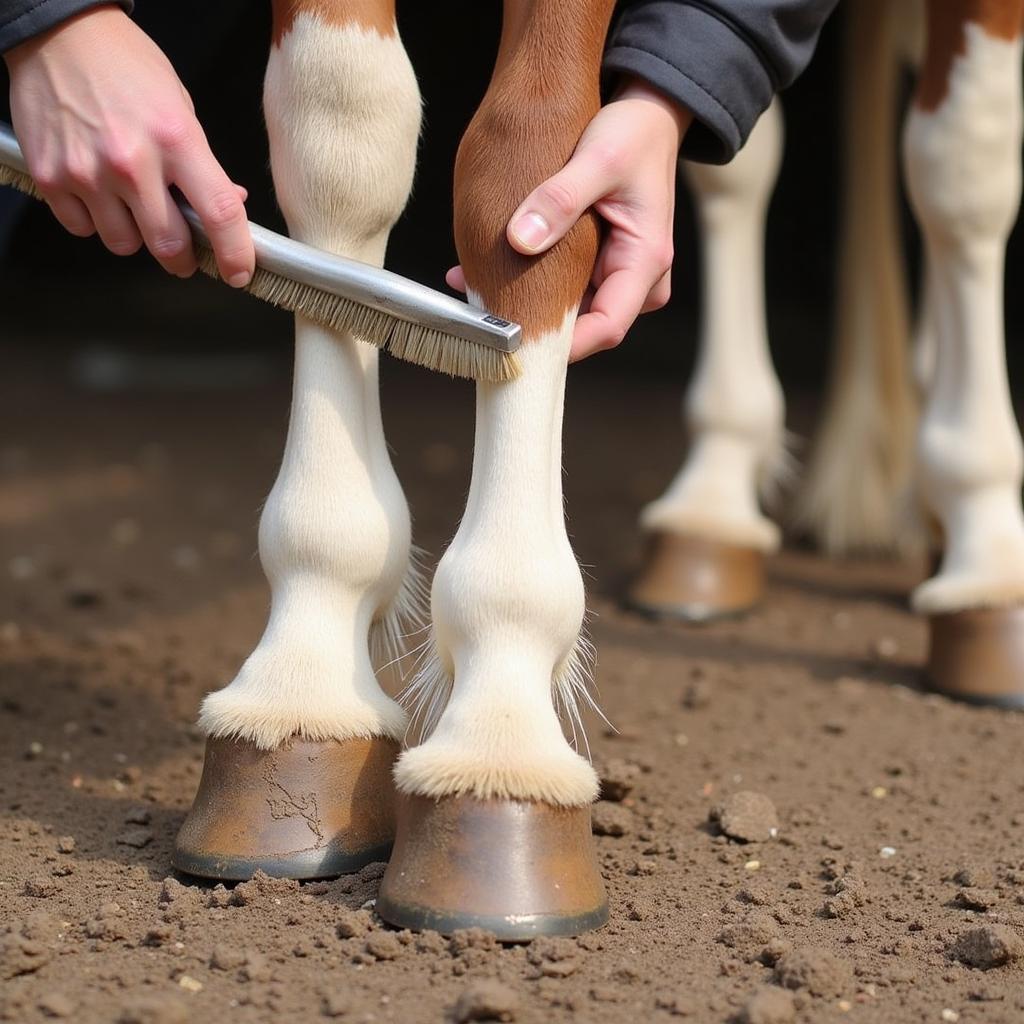Cold Blooded Horses, often admired for their strength and calm demeanor, are a fascinating group. They are known for their gentle nature, making them ideal partners for both work and leisure. But what exactly defines a cold blood? Let’s delve into the world of these impressive equines, exploring their characteristics, popular breeds, and specific care requirements.
Defining the Cold Blooded Horse
The term “cold blooded” doesn’t refer to the horse’s actual body temperature. Instead, it describes their temperament – calm, steady, and patient. These horses are typically larger and heavier than their warm-blooded and hot-blooded counterparts. cold blood horse This calm temperament, combined with their immense strength, makes them excellent working animals. They’ve historically been used for farming, pulling heavy loads, and even as warhorses. Their strength and sturdy build allow them to excel in tasks requiring power and endurance.
What are the key characteristics of cold blooded horses?
- Calm and patient temperament: Cold bloods are known for their easygoing nature, making them suitable for riders of all experience levels.
- Impressive size and strength: These horses are built for heavy work, with muscular bodies and strong legs.
- Gentle giants: Despite their size, they are generally docile and affectionate.
Popular Cold Blooded Horse Breeds
Several breeds fall under the cold blood category. Some of the most popular include:
- Clydesdale: Known for their feathered legs and gentle disposition, Clydesdales are often seen in parades and commercials.
- Shire: Shires are considered the tallest horse breed, known for their powerful build.
- Belgian Draft: These horses are incredibly strong and are often used in agricultural settings.
- Percheron: Percherons are known for their elegance and athleticism, despite their size.
Do you know which cold blooded horse is right for you? Choosing the right breed depends on your individual needs and experience. Researching different breeds can help you find the perfect match.
Caring for Cold Blooded Horses
Caring for a cold blood requires specific considerations due to their size and unique needs. Here are some essential aspects of their care:
- Nutrition: Their larger size requires a diet rich in nutrients to support their muscle mass and energy levels. They may need more forage than other horse types.
- Exercise: While they are calm, they still require regular exercise to maintain their health and prevent boredom.
- Grooming: Regular grooming is essential, especially for their feathered legs, which can be prone to matting and skin issues.
- Health: Cold blooded horses can be susceptible to certain health issues, like arthritis and respiratory problems. do horses shiver when cold Regular veterinary checkups are crucial for preventative care.
Are there specific grooming tips for cold blooded horses? Yes, paying attention to their feathering is particularly important. Regularly cleaning and conditioning can prevent problems and keep their coats healthy and beautiful.
 Grooming a Cold Blooded Horse's Feathering
Grooming a Cold Blooded Horse's Feathering
Conclusion
Cold blooded horses are a testament to the power and gentleness of the equine world. Their unique characteristics, coupled with their rich history, make them a beloved breed for many. By understanding their specific needs and providing proper care, you can ensure a long and healthy life for your cold-blooded companion. best jumping horses Interested in learning more about other horse breeds? Check out our article on best horse breeds for jumping. They might not be cold bloods, but they are just as impressive! are quarter horses warmbloods
FAQ
- Are cold blooded horses suitable for beginners?
- What is the average lifespan of a cold blood?
- What are the common health concerns for cold blooded horses?
- What type of feed is best for a cold blood?
- How much exercise does a cold blooded horse need?
- What are the key differences between cold blooded, warm-blooded, and hot-blooded horses?
- Are cold blooded horses good for driving?
Common Scenarios & Questions
Scenario: You’re considering adopting a cold-blooded horse.
Question: What are the financial implications of owning a cold blood?
Scenario: Your cold-blooded horse seems lethargic.
Question: What are the possible causes and what should I do?
Scenario: You’re new to horses and are wondering if a cold blood is right for you.
Question: What are the pros and cons of owning a cold-blooded horse compared to other types?
Further Reading & Related Topics
- Draft horse showing and competitions
- The history of cold-blooded horses in agriculture
- Understanding equine nutrition and feeding practices
Need help with your equine companion? Contact us! Phone: 0772127271, Email: [email protected]. Visit us at: QGM2+WX2, Vị Trung, Vị Thuỷ, Hậu Giang, Việt Nam. We have a 24/7 customer service team ready to assist.